THE ECHO - Ferrostaal
THE ECHO - Ferrostaal
THE ECHO - Ferrostaal
Create successful ePaper yourself
Turn your PDF publications into a flip-book with our unique Google optimized e-Paper software.
MAN FERROSTAAL ACQUIRES RWE’S PULP AND PAPER BUSINESS<br />
PULP: A PRODUCT WITH PROSPECTS<br />
<strong>THE</strong> <strong>ECHO</strong> 1/2006 23<br />
In April 2006, MAN <strong>Ferrostaal</strong> acquired the Pulp and Paper segment of RWE Industrielösungen GmbH, including 25 employees, to<br />
boost its own plant construction business.<br />
In addition to recycled paper, pulp is the most important raw<br />
material for paper. Demand is growing continuously by approximately<br />
5 million tons per year. Suitable locations for new plants<br />
are Latin America and Southeast Asia markets – in which MAN<br />
<strong>Ferrostaal</strong> already has a strong presence. Only a few suppliers<br />
worldwide are capable of building this type of plant. MAN<br />
<strong>Ferrostaal</strong> is one of them, not least because of its strong financial<br />
background and its experience in project financing.<br />
LONG-STANDING COLLABORATION<br />
In April 2006, MAN <strong>Ferrostaal</strong> therefore acquired RWE’s Pulp and<br />
Paper segment of RWE. In addition to the 25 RWE employees,<br />
expertise, references and projects as well as sales offices in<br />
Thailand and Vietnam were transferred as part of the acquisition.<br />
MAN <strong>Ferrostaal</strong> can now also rely on the expertise of KSH<br />
Solutions Inc. in Montreal, RWE’s Canadian engineering firm<br />
specialising in pulp and paper. KSH and MAN <strong>Ferrostaal</strong> have<br />
agreed on long-term, exclusive cooperation.<br />
MAN <strong>Ferrostaal</strong>’s entry into this business area is accompanied by<br />
favourable conditions. Global economic growth has led to a strong<br />
global demand for pulp. In order to meet this demand, one or two<br />
new large plants will have to begin production each year.<br />
The raw material (wood), the pulp plant in Stendal (Germany), pre-packaged pulp<br />
The global consumption of paper products is growing by two to<br />
three percent annually, with the largest growth in Asia (China,<br />
India, ASEAN nations). This results in a growing demand for pulp<br />
as the raw material for all types of paper, also with a growth of<br />
approximately 2.5 percent per year. The global demand for fresh<br />
pulp is growing by approximately 10 million tons per year (230<br />
million tons in 2005). A large part of this annual growth is<br />
accounted for by “market pulp”. This is pulp that does not go into<br />
the processing of paper in integrated plants. Instead, it sold freely<br />
on the global market by the manufacturers.<br />
This provides a sound basis for future success, according to<br />
Wolfgang Marschewski, who is responsible for the pulp plant business<br />
at MAN <strong>Ferrostaal</strong>: “New pulp plants only become profitable after<br />
they have reached a certain minimum size, and project financing<br />
plays a crucial role in this. In these kind of projects, only a<br />
financially solid plant construction partner like MAN <strong>Ferrostaal</strong><br />
will be considered as a general contractor.”<br />
GREAT POTENTIAL<br />
MAN <strong>Ferrostaal</strong> sees the greatest potential for the construction of<br />
new pulp plants in humid climate zones in Brazil, Uruguay and<br />
Chile, and in Indonesia, Malaysia, Thailand and Vietnam. Here, the<br />
raw material (wood) is grown in large plantations (approximately<br />
250,000 hectares) for approximately seven to ten years. The



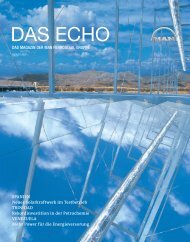

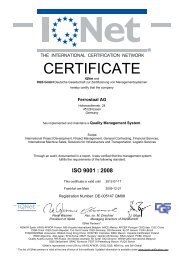
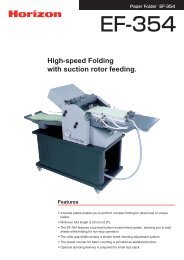
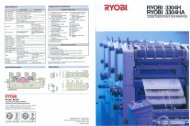
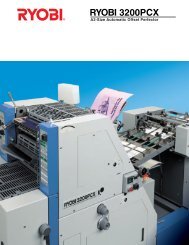

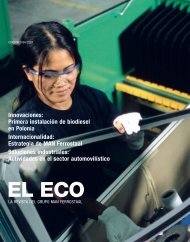





![Product information: Ryobi 3300CR [PDF, 3.1 mb] - Ferrostaal](https://img.yumpu.com/2745806/1/184x260/product-information-ryobi-3300cr-pdf-31-mb-ferrostaal.jpg?quality=85)